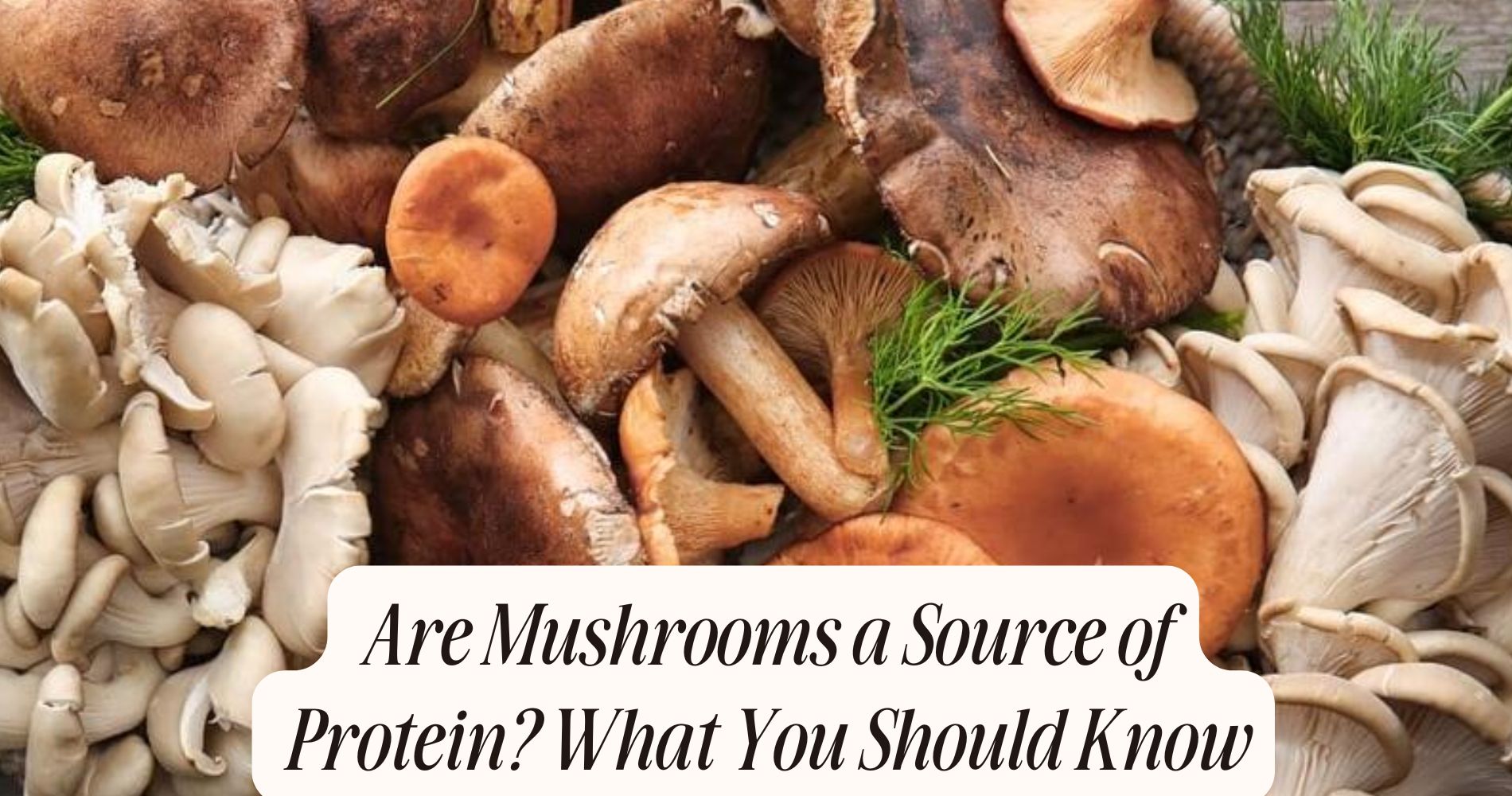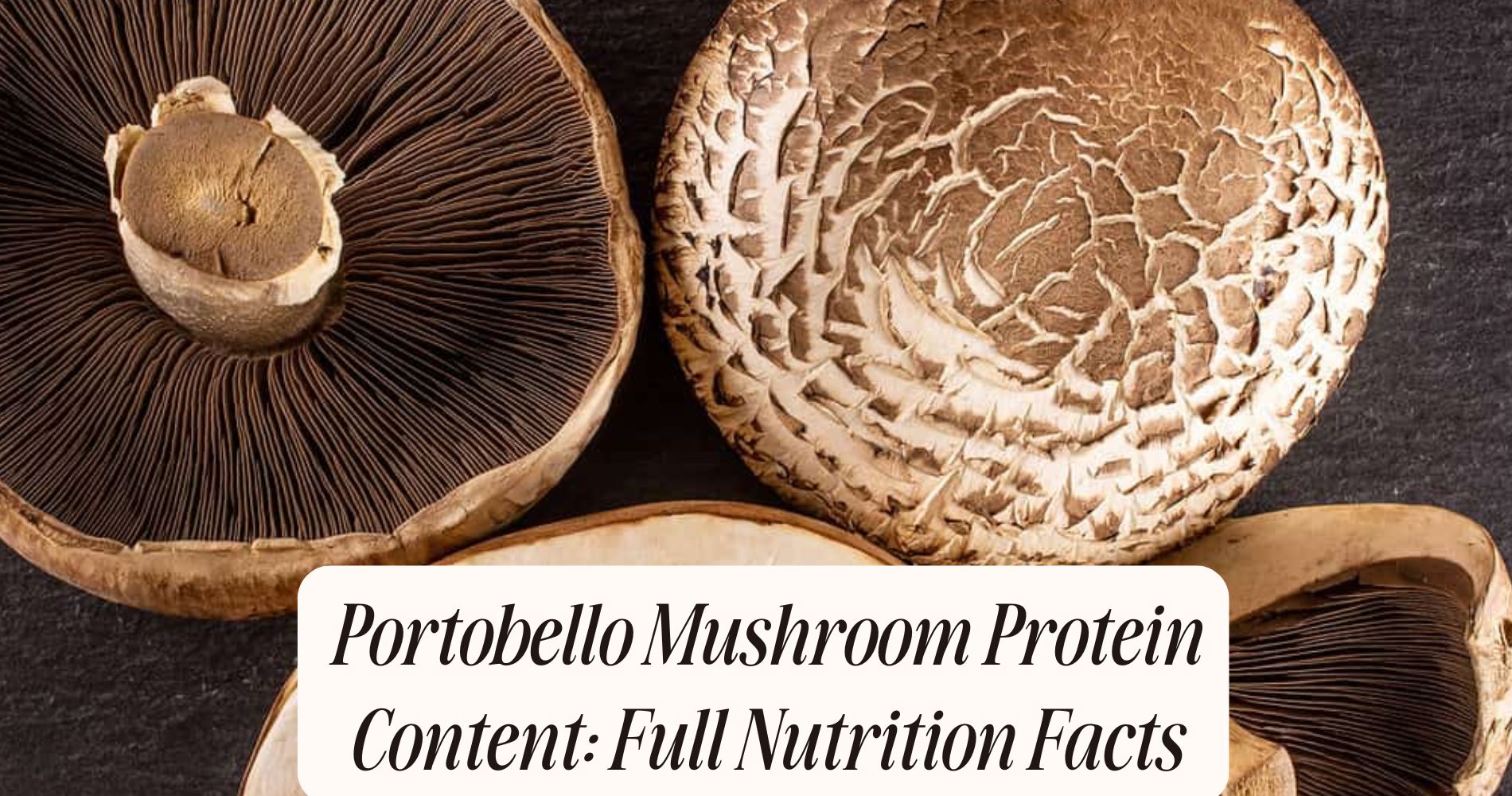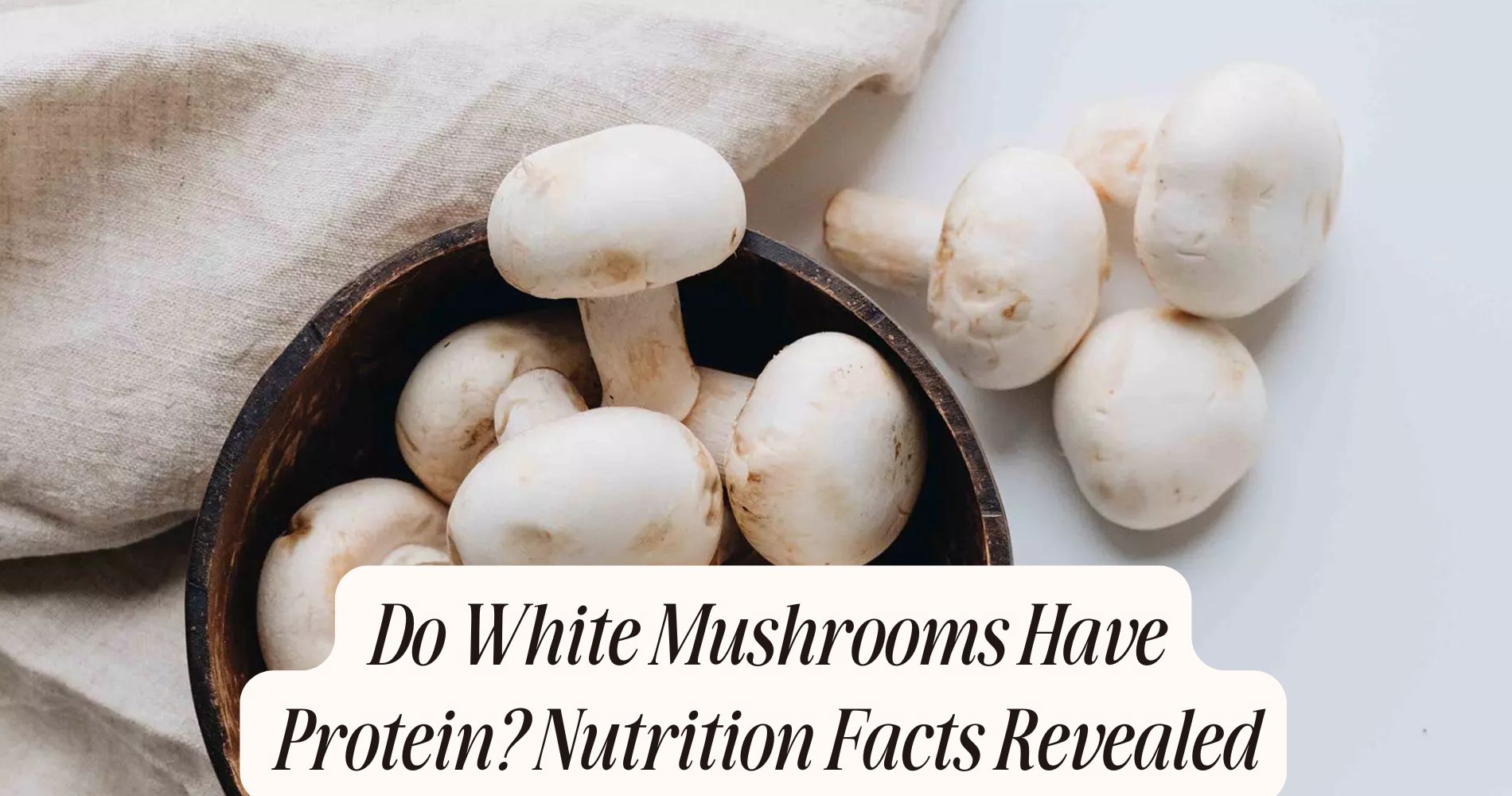
Are Mushrooms a Source of Protein? What You Should Know
Are mushrooms a source of protein? Yes, mushrooms can be a source of protein, especially for vegetarians and vegans. They contain essential amino acids, though their protein content is lower than meat or legumes. For instance, shiitake mushrooms offer about 2.2 grams of protein per 100 grams. Beyond protein, they’re rich in vitamins, minerals, and antioxidants, contributing to overall health. When you explore more, you’ll discover ways to incorporate their unique nutritional benefits into your meals and enhance your diet.
Understanding Protein: What It Is and Why It Matters
Protein is an essential macronutrient that plays an important role in your body’s overall function. It’s critical for building and repairing tissues, producing enzymes and hormones, and supporting immune function.
Protein functions include serving as a structural component in muscles, skin, and bones, as well as facilitating biochemical reactions necessary for energy metabolism. The dietary importance of protein can't be overstated; it provides the amino acids your body can't synthesize on its own.
Consuming an adequate amount of protein is essential for maintaining muscle mass, especially as you age. Furthermore, protein helps regulate hunger hormones, making it easier to manage weight.
Prioritizing protein in your diet can greatly enhance your overall health and well-being.
The Nutritional Profile of Mushrooms
Mushrooms offer a unique macronutrient composition that can complement your diet.
They contain a variety of essential amino acids, making them a valuable source of protein for both vegetarians and omnivores.
Understanding their nutritional profile can help you effectively incorporate mushrooms into your meals.
Macronutrient Composition
The nutritional profile of mushrooms reveals a unique macronutrient composition that makes them a valuable addition to a balanced diet.
Regarding macronutrient breakdown, mushrooms primarily consist of water (approximately 90%), making them low in calories. They provide modest amounts of carbohydrates and dietary fiber, which support digestive health.
While mushrooms contain some protein, it’s important to note that the protein content is lower compared to traditional sources like meat or legumes. This can be a vital dietary consideration for those relying on mushrooms as a protein source.

Amino Acid Profile
A diverse array of amino acids makes mushrooms an intriguing option for those seeking plant-based protein sources. Different mushroom types, such as shiitake and oyster, offer varying amino acid profiles, contributing to their nutritional uniqueness.
These fungi contain essential amino acids, which are crucial for protein synthesis in the body. While mushrooms may not provide as much protein per serving as meat or legumes, their amino acid content can complement a balanced diet, especially for vegetarians and vegans.
Incorporating diverse mushroom types into your meals can enhance your overall amino acid intake, supporting various bodily functions, including muscle repair and immune response. Consequently, mushrooms can be a valuable addition to your protein sources.
Protein Content in Different Mushroom Varieties
When exploring the protein content of various mushroom varieties, you'll find that not all types offer the same nutritional benefits. Edible types like shiitake, portobello, and oyster mushrooms present diverse protein levels.
For instance, shiitake mushrooms contain about 2.2 grams of protein per 100 grams, while portobellos provide around 3.1 grams. Oyster mushrooms are slightly lower, with approximately 3 grams per 100 grams.
Nutritional comparisons reveal that while mushrooms aren’t as protein-dense as meat or legumes, they still contribute valuable nutrients. Additionally, their unique amino acid profiles enhance their overall nutritional value.

Comparing Mushrooms to Other Protein Sources
While mushrooms offer a modest protein content, comparing them to traditional protein sources like meat, dairy, and legumes reveals significant differences in nutritional profiles.
For instance, common mushroom varieties such as button and shiitake contain about 3 grams of protein per 100 grams, while chicken can provide over 30 grams and lentils around 9 grams. Additionally, mushrooms lack certain essential amino acids found in animal proteins, making them an incomplete protein source.
However, they do contain unique compounds like antioxidants and vitamins that aren’t typically present in meat and dairy. Consequently, while mushrooms can be part of a protein-rich diet, relying solely on them for protein isn’t advisable.
A balanced approach that includes diverse protein sources is essential for ideal nutrition.
Health Benefits of Including Mushrooms in Your Diet
Incorporating mushrooms into your diet can yield numerous health benefits, as they're rich in essential nutrients and bioactive compounds.
These fungi provide a low-calorie source of vitamins D, B, and minerals like selenium and copper, which support immune function and overall health. Furthermore, mushrooms are high in antioxidants, helping to combat oxidative stress and reduce inflammation.
Their unique compounds, such as beta-glucans, may enhance heart health by lowering cholesterol levels. The nutritional value of mushrooms contributes to weight management due to their fiber content, promoting satiety.
Regularly including mushrooms in your meals can enhance your overall well-being, making them a valuable addition to a balanced diet.

Cooking and Preparing Mushrooms for Maximum Nutritional Value
To fully harness the health benefits of mushrooms, proper cooking and preparation techniques are essential. Cooking mushrooms enhances their nutrient absorption, particularly polysaccharides, which support immune function.
Techniques like sautéing or grilling not only intensify their flavor but also help break down tough cell walls, making nutrients more bioavailable. Pairing mushrooms with healthy fats, such as olive oil or avocado, can further improve nutrient absorption.
Flavor pairings with garlic, onions, or herbs elevate both taste and health benefits. Avoiding high-heat methods, like frying, can preserve their antioxidant properties.
Incorporating Mushrooms Into Your Meal Plans
Incorporating mushrooms into your meal plans can enhance both flavor and nutritional value. You can explore various recipe ideas that highlight their versatility, while also benefiting from their rich protein content and other essential nutrients.
Meal prep suggestions will help you seamlessly integrate these fungi into your daily diet, promoting a balanced and healthful eating pattern.
Recipe Ideas With Mushrooms
While many people think of mushrooms as a flavorful addition to meals, they also serve as a versatile protein source that can enhance your diet. You can easily incorporate them into your meal plans.
Try making mushroom risotto for a creamy dish, or prepare stuffed mushrooms filled with cheese and herbs for a tasty appetizer. For a quick meal, whip up a mushroom stir fry with your favorite vegetables.
Grilled mushrooms add a smoky flavor to salads, while mushroom soup offers a comforting option. You can’t go wrong with mushroom pizza, mushroom tacos, or even mushroom burgers as a plant-based alternative.
Sautéed mushrooms make a great side dish, and a mushroom salad can be a rejuvenating lunch option.
Nutritional Benefits Overview
Mushrooms not only enhance the flavor of your dishes but also pack a nutritional punch that can greatly benefit your overall health. Different mushroom varieties, like shiitake, portobello, and oyster, offer unique flavors and textures while providing essential nutrients.
Although mushrooms aren't a primary protein source, they do contain about 2-3 grams of protein per 100 grams, which can complement other protein sources in your meals. They’re also rich in vitamins, particularly B vitamins, and minerals such as selenium, which supports immune function.
Incorporating mushrooms into your meal plans can boost fiber intake and promote gut health. By adding these versatile fungi to your diet, you can enjoy a variety of health benefits while diversifying your culinary options.

Meal Prep Suggestions
Adding mushrooms to your meal prep can greatly enhance both the flavor and nutritional profile of your dishes. With their high water content and rich umami flavor, mushrooms can elevate various meals without adding many calories.
Consider using sautéing as a cooking technique to caramelize their natural sugars, which intensifies their taste. You can also incorporate mushrooms into stir-fries, soups, or casseroles for added texture and nutrition.
For a quick meal prep, try roasting a mix of mushrooms with herbs and spices—this enhances their earthy flavors and makes them a versatile side dish.
Finally, blending them into sauces or spreads can boost protein content and provide a creamy consistency while keeping your meals nutrient-dense.
Myths and Misconceptions About Mushrooms and Protein
Although many people believe mushrooms lack sufficient protein to be a viable dietary source, this notion is misleading. While it’s true that mushrooms contain less protein than meat or legumes, they still provide a valuable contribution to your diet.
For instance, certain varieties like shiitake and portobello can contain up to 3 grams of protein per 100 grams. Protein misconceptions often arise from comparing mushrooms to traditional protein sources without considering their unique nutritional profile.
Additionally, mushrooms are rich in essential amino acids, antioxidants, and vitamins, enhancing their overall health benefits.
Supercharge Your Health with SUPER MUSHROOM GUMMIES
Looking for a convenient and tasty way to enjoy the benefits of mushrooms? Well Gummies' SUPER MUSHROOM GUMMIES are the perfect solution! With 10 functional mushrooms packed into each vegan gummy, these gummies naturally fuel your brain, enhance focus, and support your immune system. They taste just like your favorite wild berry candy—without the jitters or crash. Energize your body and stay clear-headed all day long with SUPER MUSHROOM GUMMIES!
Frequently Asked Questions
Can Mushrooms Replace Meat in a Protein-Rich Diet?
Mushrooms can serve as meat alternatives, contributing to a dietary balance. While they provide some protein, you’ll need to combine them with other sources to guarantee adequate protein intake in your diet.
How Do Cooking Methods Affect Mushroom Protein Content?
Cooking techniques greatly influence protein retention in mushrooms. For instance, steaming preserves more protein compared to frying or boiling, which can lead to nutrient loss. Selecting appropriate methods guarantees you maximize the protein benefits of mushrooms.
Are There Specific Mushrooms High in Protein?
Certain mushroom varieties, like shiitake and oyster mushrooms, show higher protein content in protein comparisons. These options can supplement your diet effectively, offering essential amino acids while being low in calories and rich in nutrients.
Do Mushrooms Provide All Essential Amino Acids?
Mushrooms contain various amino acids, but they don't provide all essential amino acids. Their protein quality is lower compared to animal sources, so you should combine them with other protein sources for a balanced diet.
Can I Get Enough Protein From Mushrooms Alone?
You can’t rely solely on mushrooms for protein. While mushroom nutrition offers some protein benefits, they lack essential amino acids. Diversifying your protein sources guarantees you meet your body's nutritional needs effectively and healthily.
Conclusion
Incorporating mushrooms into your diet can enhance your protein intake, though they shouldn’t be your sole protein source. With varying protein content across different varieties, mushrooms offer additional health benefits, such as vitamins and antioxidants. By understanding their nutritional profile and including them in diverse recipes, you can maximize their potential. Don’t let myths deter you; mushrooms are a valuable addition to your meals, supporting overall health while contributing to your dietary protein needs.




